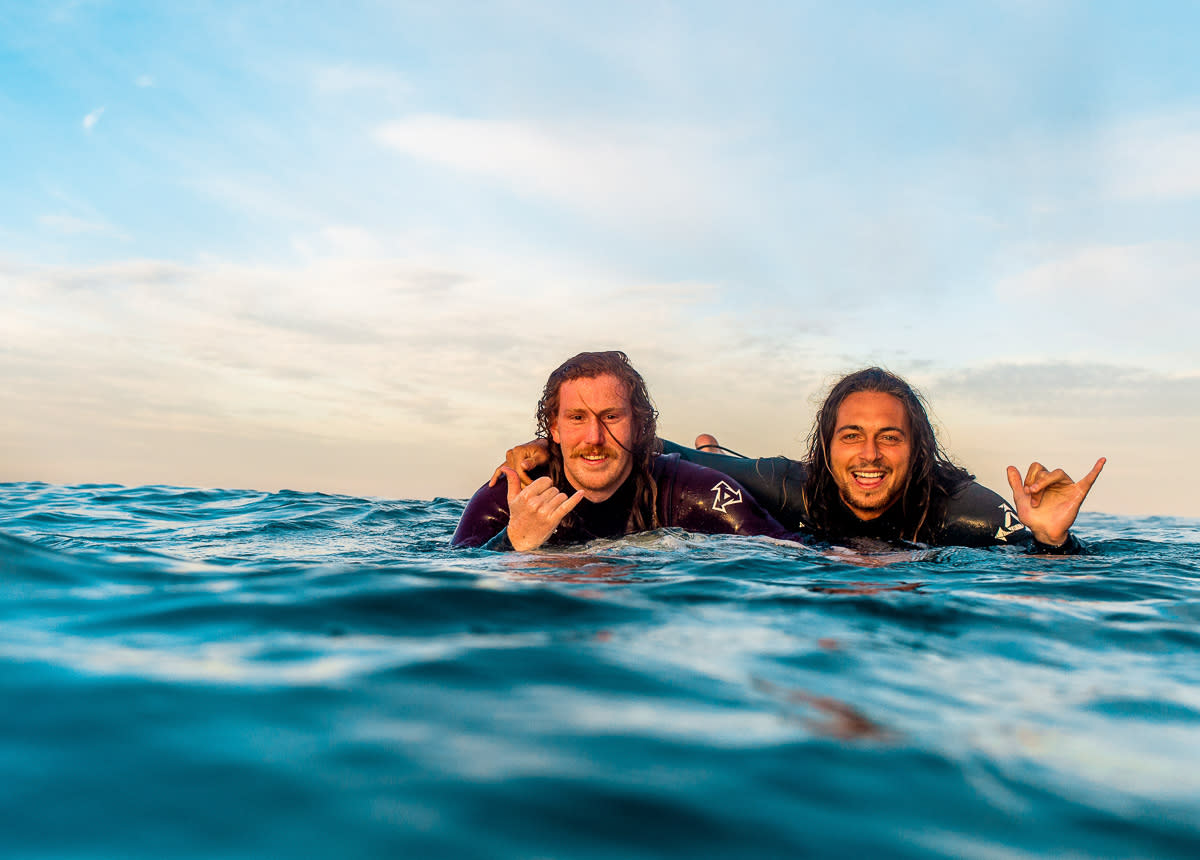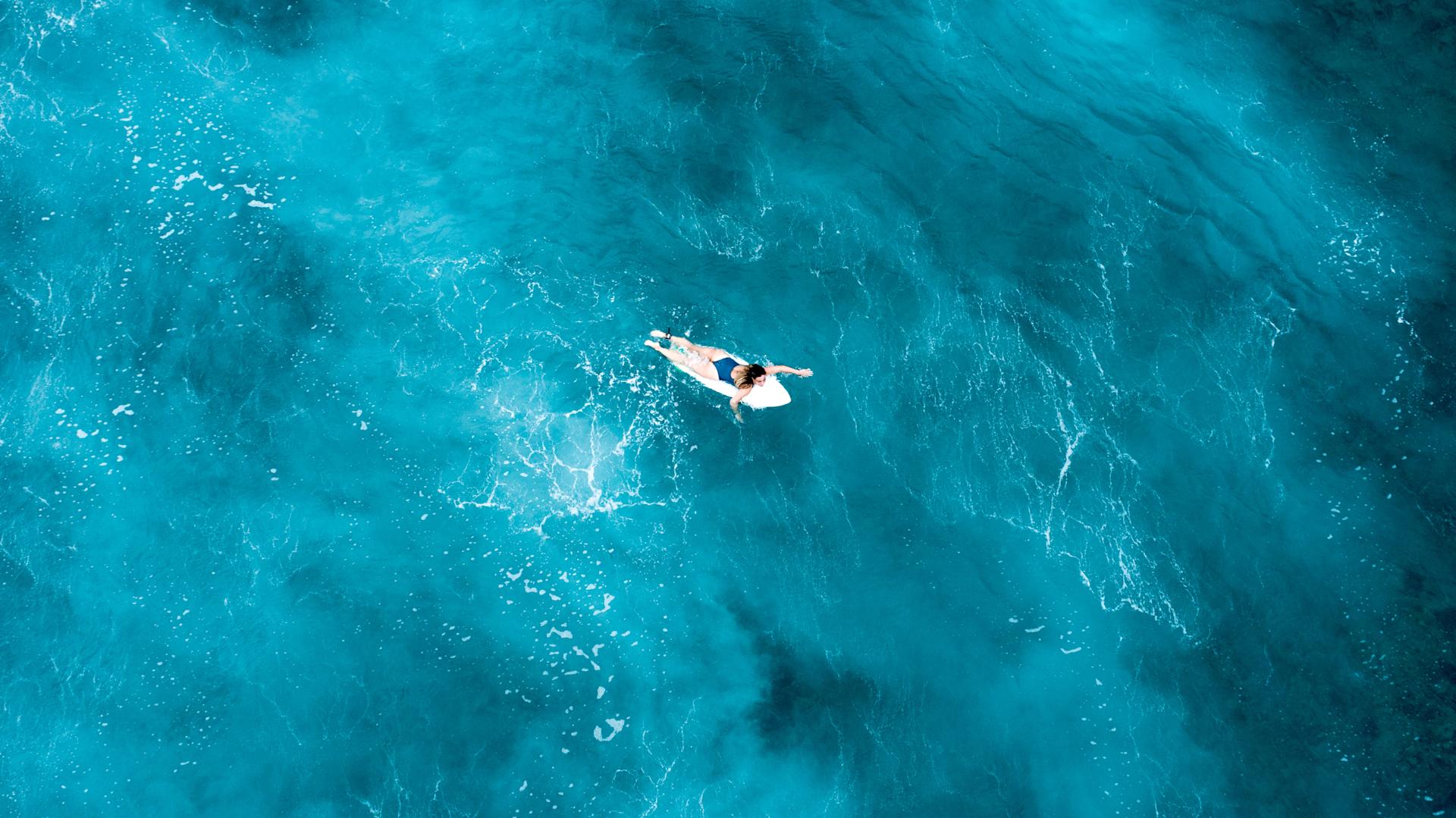
Surf etiquette and surf ethics — what you need to know
June 30, 2025Are there even rules in the ocean? A guide for what to avoid when surfing — for fewer crashes and more fun at the lineup!
Once you learn how to surf everything should be easy peasy – right? Well, there are a few rules to keep in mind when paddling out without a surf school.
Surfing is accompanied by a lifestyle that speaks for freedom and the sound of nature. But it is a sport after all, and not only any but a quite demanding one. It’s a full-body workout and with it comes risks that one needs to be aware of. It has always been said that the biggest fear for most is being tumbled in a hollow beast of waves.
But lately, we have seen a fair number of videos showing three, four or five surfboards flying up in the air and two people shouting at each other on the same wave. Might the biggest fear change to being knocked out by a board in a wave and having a fight with a local because of it?
Thankfully there is a way to avoid tricky situations at crowded spots. It is called surfing etiquette or the rules of surfing! And because they are not always displayed at beaches, we will help you with this post.
What to do when surfing (and how to avoid crashes with other surfers)
#1 — Own your limitations
The ocean is stronger than you. That does not make you weak. Believing in yourself is one thing but everyone will be much healthier and happier when we all know our strengths and are confident enough to say no to water that is yet too rough for our skill level.
#2 — Communicate
Not only about What You Will Do but also just to Socialise :-) It’s a much happier crowd if it’s not a group of strangers. Get out there and make friends. Communication is key! Especially beginners that are out by themselves for the first time will really appreciate nice people to boost their confidence!
#3 — Apologise and BE FRIENDLY
Mistakes happen. We are just human after all. But communication can make up for almost everything in the line-up. No need to be too proud to apologise.
#4 — Wave Hog

Let’s make one thing clear: if there are people in the line-up you want to impress with your skills, they will not be impressed if you catch all the bloody waves. It’s kind of like playing soccer with a team – everyone deserves the ball.
So please do not take all the waves. A good surfer shares. If you have the feeling that you don’t really get the chance to improve because you want more waves we can totally recommend you our surf skating tips that help improve your skills on land and take away the pressure.
#5 — Don't Drop-In
This is something that you might recognise the most from funny surf pages on social media. One surfer is seen riding a wave, and another one decides to paddle for it and hops in right in front of him. It’s only reasonable that this can result in discussions.
#6 — Right of Way or Who Has Priority on a Wave
When a crowd paddles for a wave, there might be two surfers in similar positions to catch the wave. The surfer closest to the pocket has right of way or priority. The other has to wait for the next one. If, however, this surfer doesn’t catch the next wave he goes for, the one after is good to go.
The other surfer should queue again. It is important to communicate in situations like that as well and shout “right” or “left” so maybe two people can surf – one to the right and one to the left. It is always leading to tricky situations, discussions and accidents when there is more than one surfer riding the same wave in the same direction.
#7 — Don't Snake on Beginner Surfers
As said before, a good surfer shares the waves. Therefore, it is super unfair to paddle around a surfer with less experience to be the one closest to the pocket just because you don’t want to wait. It is not called a LINE UP for no reason.
#8 — Give Respect to Gain Respect when Surfing Abroad
This is a brilliant note to keep in mind when travelling. Surfers living right at the spot sometimes make it ‘their’ home spot. That’s them being the Locals. It is called Localism when native people don’t want tourists in the water.
A way to gain their respect is by being friendly, not taking their waves and going to the spot a few days in a row so they recognise you. You will be surprised but after a while, they will most likely give you waves too and who knows might invite you for a beer after!
A few words of their language could work wonders making surfing with locals’ super fun!
#9 — Paddling out

When you’re at a point break try and paddle around the spot where waves break or where you see whitewash. The goal is always to avoid being in the way of someone on a wave. If you get caught in the whitewash, try and get to the part where there are no breaking waves sideways before paddling out towards the line-up.
#10 — Take Care of The Environment
Easily said, even easier done. If you see rubbish, even if it’s not yours, put it in a bin. You can also try and bring reusable water bottles environmentally friendly sunscreen and zinc.
#11 — Do Not Throw Your Board
You might also know this as chicken dives. You are paddling out, see a big wave break in front of you, get scared, ditch your board and dive under the wave without it. Try to avoid this when there are others around you. Throwing your board can be very dangerous because you can’t control if the board is landing on top of another surfer. Take surf lessons for intermediates to practice a turtle roll if you have a bigger board.
Once you step down in board size you can practice duck dives.
Well, enough talks of chicken, turtle and duck. The most important when it comes to international surfing is to have fun because the surfer that has the most fun is the best surfer out there! There is nothing more precious than spending a beautiful day in the ocean laughing and cheering for and with your friends.
NEWSLETTER
Stay up to date, sign up for our newsletter

Maren Gimnes
Maren is a copywriter and content creator with a true passion for exploring the beautiful planet we call home. Her love for the ocean and salty days brought her to Lapoint, where she’s been living the digital nomad life and visiting our surf camps in all corners of the world. Maren aims to inspire others to pursue the surf lifestyle, to never miss a sunset and to follow their dreams.

